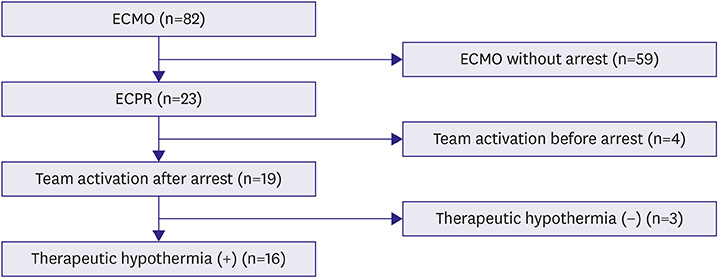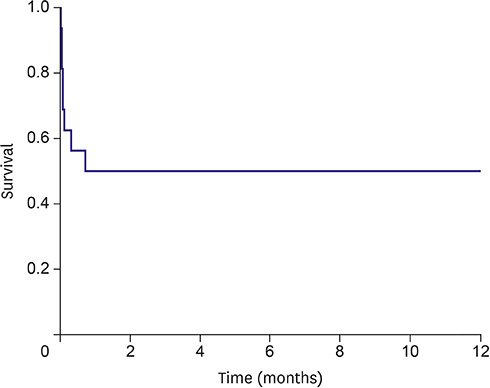Korean Circ J.
2017 Nov;47(6):939-948. 10.4070/kcj.2017.0079.
Extracorporeal Cardiopulmonary Resuscitation with Therapeutic Hypothermia for Prolonged Refractory In-hospital Cardiac Arrest
- Affiliations
-
- 1Department of Thoracic and Cardiovascular Surgery, Ulsan University Hospital, University of Ulsan College of Medicine, Ulsan, Korea.
- 2Department of Cardiology, Ulsan University Hospital, University of Ulsan College of Medicine, Ulsan, Korea.
- 3Department of Thoracic and Cardiovascular Surgery, Andong Hospital, Andong, Korea.
- 4Department of Emergency Medicine, Ulsan University Hospital, University of Ulsan College of Medicine, Ulsan, Korea. koreanermd@gmail.com
- KMID: 2396487
- DOI: http://doi.org/10.4070/kcj.2017.0079
Abstract
- BACKGROUND AND OBJECTIVES
We identified the impact of extracorporeal cardiopulmonary resuscitation (ECPR) followed by therapeutic hypothermia on survival and neurologic outcome in patients with prolonged refractory in-hospital cardiac arrest (IHCA).
METHODS
We enrolled 16 adult patients who underwent ECPR followed by therapeutic hypothermia between July 2011 and December 2015, for IHCA. Survival at discharge and cerebral performance category (CPC) scale were evaluated.
RESULTS
All patients received bystander cardiopulmonary resuscitation (CPR); the mean CPR time was 66.5±29.9 minutes, and the minimum value was 39 minutes. Eight patients (50%) were discharged alive with favorable neurologic outcomes (CPC 1-2). The mean follow-up duration was 20.1±24.3 months, and most deaths occurred within 21 days after ECPR; thereafter, no deaths occurred within one year after the procedure.
CONCLUSION
ECPR followed by therapeutic hypothermia could be considered in prolonged refractory IHCA if bystander-initiated conventional CPR is performed.
MeSH Terms
Figure
Reference
-
1. Anselmi A, Flécher E, Corbineau H, et al. Survival and quality of life after extracorporeal life support for refractory cardiac arrest: a case series. J Thorac Cardiovasc Surg. 2015; 150:947–954.2. Bednarczyk JM, White CW, Ducas RA, et al. Resuscitative extracorporeal membrane oxygenation for in hospital cardiac arrest: a Canadian observational experience. Resuscitation. 2014; 85:1713–1719.3. Haneya A, Philipp A, Diez C, et al. A 5-year experience with cardiopulmonary resuscitation using extracorporeal life support in non-postcardiotomy patients with cardiac arrest. Resuscitation. 2012; 83:1331–1337.4. Kagawa E, Inoue I, Kawagoe T, et al. Assessment of outcomes and differences between in- and out-of-hospital cardiac arrest patients treated with cardiopulmonary resuscitation using extracorporeal life support. Resuscitation. 2010; 81:968–973.5. Chen YS, Lin JW, Yu HY, et al. Cardiopulmonary resuscitation with assisted extracorporeal life-support versus conventional cardiopulmonary resuscitation in adults with in-hospital cardiac arrest: an observational study and propensity analysis. Lancet. 2008; 372:554–561.6. Chen JS, Ko WJ, Yu HY, et al. Analysis of the outcome for patients experiencing myocardial infarction and cardiopulmonary resuscitation refractory to conventional therapies necessitating extracorporeal life support rescue. Crit Care Med. 2006; 34:950–957.7. Massetti M, Tasle M, Le Page O, et al. Back from irreversibility: extracorporeal life support for prolonged cardiac arrest. Ann Thorac Surg. 2005; 79:178–183.8. Link MS, Berkow LC, Kudenchuk PJ, et al. Part 7: adult advanced cardiovascular life support: 2015 American Heart Association Guidelines update for cardiopulmonary resuscitation and emergency cardiovascular care. Circulation. 2015; 132:S444–64.9. Stub D, Bernard S, Pellegrino V, et al. Refractory cardiac arrest treated with mechanical CPR, hypothermia, ECMO and early reperfusion (the CHEER trial). Resuscitation. 2015; 86:88–94.10. Ryu JA, Cho YH, Sung K, et al. Predictors of neurological outcomes after successful extracorporeal cardiopulmonary resuscitation. BMC Anesthesiol. 2015; 15:26.11. Kim SJ, Jung JS, Park JH, Park JS, Hong YS, Lee SW. An optimal transition time to extracorporeal cardiopulmonary resuscitation for predicting good neurological outcome in patients with out-of-hospital cardiac arrest: a propensity-matched study. Crit Care. 2014; 18:535.12. Patel JK, Schoenfeld E, Parnia S, Singer AJ, Edelman N. Venoarterial extracorporeal membrane oxygenation in adults with cardiac arrest. J Intensive Care Med. 2016; 31:359–368.13. Ortega-Deballon I, Hornby L, Shemie SD, Bhanji F, Guadagno E. Extracorporeal resuscitation for refractory out-of-hospital cardiac arrest in adults: a systematic review of international practices and outcomes. Resuscitation. 2016; 101:12–20.14. Siao FY, Chiu CC, Chiu CW, et al. Managing cardiac arrest with refractory ventricular fibrillation in the emergency department: conventional cardiopulmonary resuscitation versus extracorporeal cardiopulmonary resuscitation. Resuscitation. 2015; 92:70–76.15. Badjatia N, Strongilis E, Gordon E, et al. Metabolic impact of shivering during therapeutic temperature modulation: the Bedside Shivering Assessment Scale. Stroke. 2008; 39:3242–3247.16. Wang CH, Huang CH, Chang WT, et al. Associations among gender, marital status, and outcomes of adult in-hospital cardiac arrest: a retrospective cohort study. Resuscitation. 2016; 107:1–6.17. Kim DH, Kim JB, Jung SH, Choo SJ, Chung CH, Lee JW. Extracorporeal cardiopulmonary resuscitation: predictors of survival. Korean J Thorac Cardiovasc Surg. 2016; 49:273–279.18. Sakamoto S, Taniguchi N, Nakajima S, Takahashi A. Extracorporeal life support for cardiogenic shock or cardiac arrest due to acute coronary syndrome. Ann Thorac Surg. 2012; 94:1–7.19. Pang PY, Wee GH, Hoo AE, et al. Therapeutic hypothermia in adult patients receiving extracorporeal life support: early results of a randomized controlled study. J Cardiothorac Surg. 2016; 11:43.20. Rittenberger JC, Friess S, Polderman KH. Emergency neurological life support: resuscitation following cardiac arrest. Neurocrit Care. 2015; 23:Suppl 2. S119–S128.
- Full Text Links
- Actions
-
Cited
- CITED
-
- Close
- Share
- Similar articles
-
- Clinical Implementation of Therapeutic Hypothermia after Cardiac Arrest
- Complete Recovery after Prolonged Resuscitation Using Extracorporeal Membrane Oxygenation for In-hospital Arrest Due to Refractory Ventricular Fibrillation
- Extracorporeal Life Support After Prolonged Resuscitation for In-Hospital Cardiac Arrest due to Refractory Ventricular Fibrillation: Two Cases Resulting in a Full Recovery
- Intracranial Hemorrhage Identified in the Early Stage after Applying Extracorporeal Membrane Oxygenation to Support Cardiopulmonary Resuscitation
- Combination of extracorporeal membrane oxygenation and in-line hemofiltration for the acute hyperkalemic cardiac arrest in a patient with Duchenne muscular dystrophy following orthopedic surgery: a case report



